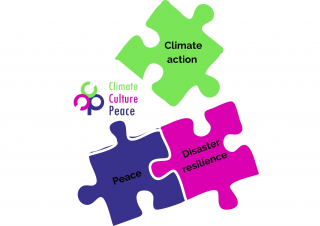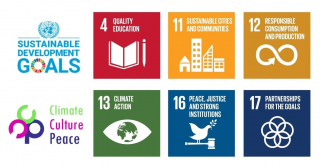As the UN Climate Change Conference COP 26 in Glasgow has drawn to a close with an action plan for decarbonizing being negotiated, tough challenges lie ahead. This is especially the case for those who are at the frontlines of the climate crisis.
Cyclic disasters and conflicts fuelled by environmental stresses have displaced lives, livelihoods and cultures in many parts of the world. While science and technology are crucial for identifying clean energy options, cultural knowledge supplements the existing scientific data by connecting human knowledge and experience, helping people to adapt to a changing climate and cope with loss and displacement.
Today, countries are hoping to achieve the target of “Net Zero” by 2050. While not all emissions can be reduced to zero, they can be reduced or balanced.
The challenge of limiting global warming to 1.5 °C, is not purely technical. It is a moral and cultural imperative.
Climate.Culture.Peace is a knowledge-building initiative with a particular focus on the 18 CPF target countries of Afghanistan, Egypt, Ethiopia, Iraq, Jordan, Kenya, Lebanon, Libya, Palestine, Rwanda, South Sudan, Sudan, Syria, Tanzania, Tunisia, Turkey, Uganda and Yemen. This project is organized by ICCROM with the support of the British Council’s Cultural Protection Fund (CPF), and in partnership with the Department for Digital, Culture, Media and Sport (DCMS), and seeks the participation from all CPF target countries.
The conference explores the nexus between climate action, peace, disaster resilience and culture. The aim is to build a globally applicable foundation for engaging culture and heritage in climate action. For further details on the conference, its themes and sub-themes, read the conference concept note.
The Climate.Culture.Peace initiative is endorsed by 55 multidisciplinary partners from 33 countries representing universities and research institutions, cultural heritage departments, museums and archives, international organizations for culture and heritage, national heritage NGOs and foundations, humanitarian and development aid agencies, as well as climate change and disaster risk management agencies. Through this unique knowledge building and networking exercise, the partners will facilitate a cross-disciplinary exchange that will help forge a path for the future (watch the video, meet our partners).
An associated knowledge portal featuring case studies, videos and testimonies on how culture can be used to mitigate and adapt to climate change will also be set up as part of this initiative.
Conceived and designed within the framework of ICCROM's flagship programme First Aid and Resilience for Cultural Heritage in Times of Crisis (FAR), the project will be led by Aparna Tandon, Senior Programme Leader. Dr Marcy Rockman, an archaeologist and a leading climate-heritage expert will lead the scientific committee as coordinator, while conservation architects and consultants for the FAR Programme, Jui Ambani, Mohona Chakraburtty, Anthony Rizk and Joao Pedro Otoni, will compose the core organizing team of the conference.
The conference, and its associated knowledge portal, will address the following Sustainable Development Goals (SDG) and their specific targets:
- SDG 4 – Quality Education
- SDG 11 – Sustainable Cities and Communities
- SDG 12 – Responsible Consumption and Production.
- SDG 13 – Climate Action
- SDG 16 – Peace, Justice and Strong Institutions
- SDG 17 – Revitalize Global Partnerships
List of the existing consortium partners
- AE&CC - ENSAG - University of Grenoble Alpes, France
- Ahmadu Bello University, Nigeria
- Archi.Media Trust, Italy
- Australia ICOMOS
- Avans University of Applied Sciences, Netherlands
- Casa K’ojom Cultural Rescue Center, Guatemala
- CRATerre, France
- CRRP (Confederation of Risk Reduction Professionals), India
- Department of Architecture, Hazara University, Pakistan
- Dept. of Civil and Environmental Engineering of the University of Florence, Italy
- Department of Civil Engineering (DEC) of the Faculty of Engineering of the University of Porto, Portugal
- Department of History, Representation and Restoration of Architecture – Sapienza University of Rome, Italy
- Directorate General Antiquities and Archaeology – Government of Sindh, Pakistan
- Endangered Archaeology in the Middle East and North Africa (EAMENA) project, School of Archaeology, the University of Oxford, United Kingdom
- Faculty of Architecture, Omdurman Islamic University, South Sudan
- General Organization for Preservation of Historic Cities (GOPHCY), Yemen
- Gujarat Institute of Disaster Management (GIDM), India
- Historical Museum of Sarmiento, Argentina
- ICOM Mozambique
- ICOM Zambia
- ICOMOS Brazil – Climate Change and Heritage Focal Point
- ICOMOS-ICORP Turkey
- ICOMOS Italy
- ICOMOS Peru
- Institute of Materials and Constructions (IMC) and the Institute of Earth Sciences (IST) of the University of Applied Sciences and Arts of Southern Switzerland
- IEPHA (Instituto Estadual do Patrimônio Histórico e Artístico de Minas Gerais), Brazil
- International Institute for Conservation (IIC)
- LEAD, India
- Loughborough University, United Kingdom
- Ministry of Culture Strengthening Museums Program, Colombia
- Moto Moto Museum, Zambia
- Musée Régional du Centre/Sokodé, Togo
- National Archives of Malawi
- National Commission for Museums and Monuments (NCMM), Nigeria
- National Centre for Arts and Culture, Gambia
- National Research Institute of Astronomy and Geophysics (NRIAG), Egypt
- National Museum of Uganda
- Sursock Museum, Lebanon
- State Emergency Management Agency, Nigeria
- Sindh community Foundation, Pakistan
- Swedish National Heritage Board
- The Egyptian Heritage Rescue Foundation (EHRF)
- Turathuna Syria (NGO based in Syria)
- The Foundation for Peace and Cultural Heritage Development, Nigeria
- The Georgia Red Cross Society
- U-INSPIRE Alliance,
- UNICEF Syria
- UNESCO Regional Office of Eastern Africa, Kenya
- UNESCO Club South Sudan
- UNESCO Chair on Prevention and sustainable management of geo-hydrological hazards of the University of Florence, Italy
- UNDRR Europe & Central Asia
- Universidade Federal de Minas Gerais (UFMG) / Graduate Program on Built Environment and Sustainable Heritage, Brazil
- University of Lincoln, United Kingdom
- YKRB Foundation, Yemen
- YUYAI-UNI, Grupo De Investigación Sobre Patrimonio de La Universidad Nacional De Ingeniería, Peru
Watch our teaser video again:


